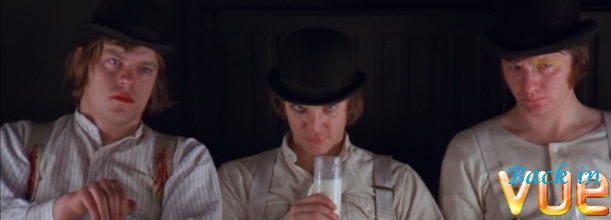Back in Vue #5 – A Clockwork Orange

When I look back, I don’t think I can recall a time where I wasn’t aware of A Clockwork Orange. Its staggering cult status is such that, even if you have never actually seen it, you damn well know of it. I have memories of frequenting Camden market and seeing its movie stills splashed across T-shirts and posters. When I was 15 I used a whole tub of mascara trying to recreate the iconic spider-like eye of its protagonist Alex for a Hallowe’en party. I also stole my granddad’s bowler hat and cream coloured long Johns. It was a magical evening.
Of course, I didn’t actually watch the film until several years after that night. Needless to say – it stunned me. At some point during the growing stages of a film lover’s career, they discover the film that becomes the game changer. It breaks them away from the Hollywood drip feed that permeates adolescence and opens their mind to alternative cinema. For me, that film was A Clockwork Orange.
Given that my introduction to Kubrick’s masterpiece was through the medium of a dodgy Oxfam-bought VHS, I was excited to witness it on the silver screen for the first time. Perhaps predictably – given its show time of Monday night and proximity to Westfield shopping centre, I was one of 6 people in the room. This experience wasn’t met with disdain: given the intimate relationship I have with what I consider to be director Stanley Kubrick’s masterpiece, I was happy to experience it in low key surroundings. Plus it meant I could fashion myself into 3 seats on the back row.
Based on Anthony Burgess’ novel of the same name, the film is set in a dystopic future Britain, following the life of lawless protagonist Alex DeLarge as he engages in psychopathic activities with his gang members, his ‘droogs’, for fun – the likes of which include ‘ultra violence’ and rape, or “the old in-out in-out”. He speaks eloquently and adores classical music, in particular the symphonies of Ludwig van Beethoven. His enthusiastic disregard of morality is matched only by his sinister charm, perfectly expressed by a young Malcolm McDowell in the role that would come to define his career. When Alex is caught and arrested for murder, he is sentenced to life imprisonment. His fate is turned when he becomes the subject of a new brand of therapy that conditions the law breaker to be good, thus raising the issue of morality and choice: is it better to have free will, or be forced to be good? Like an orange, Alex is something natural and unique. But his treatment turns him into a machine, operating like clockwork.
It is harrowing subject matter, made all the more overpowering by the film’s cinematography. As soon as that opening sequence hit me in glorious surround sound, I remembered how it changed my perception of cinema: the bright red screen lighting up the entire room, as the ominous sci fi notes of the title sequence – the brilliant ‘Music for the Funeral of Queen Mary – March’ by Henry Purcell start to fade in. The cut to blue, with the words ‘A Stanley Kubrick Production’, followed by ‘A Clockwork Orange’ back on red, and then a close up of Alex, leering at us from beneath his famous bowler hat and eye. As his voice-over sets the scene, Kubrick’s camera begins a slow pan out, to reveal a futuristic pop art setting, setting the stylistic framework for the entire film. It is one of cinema’s most exceptional opening sequences.
It is, of course, also infamous for its violent content. In 1971, Kubrick himself banned it at its time of release due to reports of audiences mimicking the violent actions of its anti hero. The shock factor has diluted with time – most cinema goers have by now seen sexual violence of a much more visceral nature. But as a film it is no less intoxicating than it was 40 years ago.
And so, A Clockwork Orange is not simply a must see at the cinema: I believe it to be mandatory viewing for all lovers of the medium. I am happy to have finally had the chance to witness it on the big screen, and I urge film lovers to nab the opportunity the first chance they get.





Recent Comments